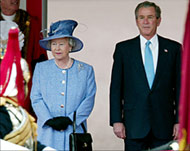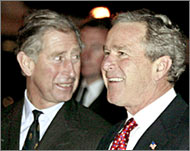Brits split as Bush comes to shove
US President George Bush’s state visit to the UK came at “precisely the right time,” according to British Prime Minister Tony Blair.

But the invitation was actually extended seventeen months ago, by the Royal Visits Committee, which meets twice a year to roll out the red carpet for foreign heads of state.
“President Bush was not singled out for an invitation,” a Foreign Office spokesperson told Aljazeera.net. “There is no Iraq link. Russia’s President Putin also came earlier this year, and we have had lots of different visits.”
For the Foreign Office, why President Bush was specifically invited at this time is a “matter for the Palace”. For the Palace, it is a “matter for the government”.
Either way, it is not a matter for the people.
Protests
The streets of The Mall have been turned into a no-go zone for British citizens, while up to 14,000 police officers, one in nine of all those in the country, are seconded to protect the president from the wrath of the people he is supposed to be visiting.
The Stop the War Coalition now expect more than 100,000 people to join their demonstration against Bush’s visit, and police plans for an “exclusion zone” around central London have been overwhelmed.
 |
|
Polls found 43% of Britons |
|
|
Sir Harold Walker, the last British ambassador to Iraq in 1991, said the visit was intended to cement ties between the two countries.
“I doubt whether Bush’s advisers told him to come here for electoral considerations,” he said. “Visits to friendly countries don’t figure largely in US politics and my understanding is that so far, this visit has hardly been covered by the US media.”
Photo ops
Shots of a vast presidential cavalcade sweeping through overcast and deserted London streets may not help persuade US voters to re-elect Bush. Any pictures of the president meeting the Queen will be easily counter-balanced by more hostile footage of demonstrators.
However, Martin McIvor, the director of the Labour-aligned think tank, Catalyst, said that decisions to make such visits were routinely taken with one eye on the polls.
“We’ve been told it was planned some time ago when the current political climate could not have been predicted,” he said.
“But obviously it’s come at a bad time for the British government, given the broad public discomfort about our relationship with the US.”
No majority
Discomfort there clearly is, but many in the anti-war movement were disheartened by a recent telephone poll published by The Guardian.
It found that 43% of voters welcomed Bush’s visit, compared to 36% who did not. McIvor, however, was not fazed.
 |
|
Bush is expected to give staunch |
“Forty three percent is not a majority,” he countered. “The idea that only 43% felt they could welcome the president of the USA, an ally, on a friendly visit to this country is actually a rather disappointing result.”
In fact, an unreported poll, released on Tuesday by the Greater London Authority, found that 59% of Londoners felt that the war had not been justified and 48% now felt less safe as a result of it. Only 3% felt safer.
Yet, when he addressed London’s Banqueting House, Bush asked: “Who will say that the world was a safer place when he [Saddam Hussein] was in power?” Many Londoners, according to the GLA.
Divided
The effect of the anti-war movement on public opinion, combined with the ongoing resistance in Iraq, is continuing to cause splits in the British establishment.
Like in the early stages of the Vietnam conflict, tactical differences among rival establishments are now overshadowing strategic unity.
Behind the smiles and salutes, Sir Harold Walker believes that Iraq will be the hot potato during two and a half hours of discussions at Downing Street on Thursday.
“I believe that leaders of this Cabila (tribe), who know each other well, will talk at a high level of generality and sophistication about the way they hope the whole world will develop,” he said.
“But one can imagine that the British with their long experience of colonial situations and Northern Ireland will be advising that using military means alone (in Iraq) won’t work.”
Occupation woes
“Iraq is a complex society and you can’t have men in tanks riding roughshod like Israelis through Falluja,” added Sir Harold.
 |
|
Observers ask why the US leader |
He doubted that democracy could be spread with what he described as “grandiose and arrogant speeches” that offend people.
Such doubts are now widespread in the civil service. Another former Foreign Office official said he thought the entire US-UK strategy towards Iraq was now in danger of failure.
“Having felt very certain last autumn and throughout the war, I’m now extremely uncertain,” he said.
Middle East
Iraq will not be the only item on the agenda of the Downing Street summit. The prime minister’s spokesman has flagged up discussions on the gathering transatlantic trade war, the fate of the British Guantanamo Bay detainees and the Palestinian-Israeli conflict.
|
“Iraq is a complex society and you can’t have men in tanks riding roughshod like Israelis through Falluja” Sir Harold Walker, |
This latter issue, though, only serves to highlight simmering discontent at the way that British foreign policy has been run by the current administration.
“The pressure is on Tony Blair to get some movement in Palestine,” said McIvor. “His gambit was that by standing close to the US on military interventions, he could wield influence.”
Labour backbenchers are looking for returns on that and feeling sceptical that there will be any, he added.
“I think there is increasing concern that Blair has made a monumental and definitive error over this whole set of issues and jeopardised both his legacy and the legacy that they hoped a Labour government would have left.”
Restive backbenchers, a public in revolt, foreign policy disasters and a royal family in crisis; what better time could a US president pick for a visit?